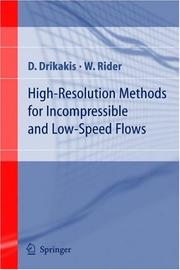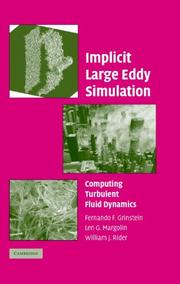| Listing 1 - 10 of 12 | << page >> |
Sort by
|
Book
Year: 1656 Publisher: [London] : Printed for the author, and are to be sold by R. Moon, at the seven Stars in Pauls-Church-yard, near the great North door,
Abstract | Keywords | Export | Availability | Bookmark
 Loading...
Loading...Choose an application
- Reference Manager
- EndNote
- RefWorks (Direct export to RefWorks)
eebo-0018

ISBN: 128030474X 9786610304745 354026454X 3540221360 364206051X Year: 2005 Publisher: Berlin : Springer-Verlag,
Abstract | Keywords | Export | Availability | Bookmark
 Loading...
Loading...Choose an application
- Reference Manager
- EndNote
- RefWorks (Direct export to RefWorks)
Dimitris Drikakis is Professor and Head of Fluid Mechanics and Computational Science Group at Cranfield University, United Kingdom. His research interests include computational methods, modeling of turbulent flows, unsteady aerodynamics, flow instabilities, shock waves and gas dynamics, biological flows, computational nanotechnology and nanoscience, and high performance computing. William Rider is project and team leader in the Continuum Dynamics Group in the Computer and Computational Sciences Division of the Los Alamos National Laboratory (LANL), U.S.A. His principal interest is computational physics with an emphasis on fluid dynamics, radiation transport, turbulent mixing, shock physics, code verification, code validation and models for turbulence. This book covers the basic techniques for simulating incompressible and low-speed flows with high fidelity in conjunction with high-resolution methods. This includes techniques for steady and unsteady flows with high-order time integration and multigrid methods, as well as specific issues associated with interfacial and turbulent flows. The book is addressed to a broad readership, including engineers and scientists concerned with the development or application of computational methods for fluid flow problems in: Mechanical, Aerospace, Civil and Chemical Engineering, Biological Flows, Atmospheric and Oceanographic Applications as well as other Environmental disciplines. It can be used for teaching postgraduate courses on Computational Fluid Dynamics and Numerical Methods in Engineering and Applied Mathematics, and can also be used as a complementary textbook in undergraduate CFD courses.
Physics. --- Computer mathematics. --- Fluids. --- Acoustics. --- Computational intelligence. --- Fluid mechanics. --- Engineering Fluid Dynamics. --- Fluid- and Aerodynamics. --- Computational Intelligence. --- Computational Science and Engineering. --- Hydromechanics --- Continuum mechanics --- Intelligence, Computational --- Artificial intelligence --- Soft computing --- Hydraulics --- Mechanics --- Physics --- Hydrostatics --- Permeability --- Computer mathematics --- Discrete mathematics --- Electronic data processing --- Natural philosophy --- Philosophy, Natural --- Physical sciences --- Dynamics --- Mathematics --- Fluid dynamics. --- Mathematical analysis. --- 517.1 Mathematical analysis --- Mathematical analysis --- Fluid mechanics --- Hydraulic engineering. --- Engineering. --- Computer science. --- Informatics --- Science --- Construction --- Industrial arts --- Technology --- Engineering, Hydraulic --- Engineering --- Shore protection
Digital
ISBN: 9783540264545 Year: 2005 Publisher: Berlin, Heidelberg Springer-Verlag Berlin Heidelberg
Abstract | Keywords | Export | Availability | Bookmark
 Loading...
Loading...Choose an application
- Reference Manager
- EndNote
- RefWorks (Direct export to RefWorks)
Classical mechanics. Field theory --- Gases handling. Fluids handling --- toegepaste mechanica --- mechanica --- vloeistoffen
Book
ISBN: 9783540264545 Year: 2005 Publisher: Berlin Heidelberg Springer Berlin Heidelberg
Abstract | Keywords | Export | Availability | Bookmark
 Loading...
Loading...Choose an application
- Reference Manager
- EndNote
- RefWorks (Direct export to RefWorks)
Dimitris Drikakis is Professor and Head of Fluid Mechanics and Computational Science Group at Cranfield University, United Kingdom. His research interests include computational methods, modeling of turbulent flows, unsteady aerodynamics, flow instabilities, shock waves and gas dynamics, biological flows, computational nanotechnology and nanoscience, and high performance computing. William Rider is project and team leader in the Continuum Dynamics Group in the Computer and Computational Sciences Division of the Los Alamos National Laboratory (LANL), U.S.A. His principal interest is computational physics with an emphasis on fluid dynamics, radiation transport, turbulent mixing, shock physics, code verification, code validation and models for turbulence. This book covers the basic techniques for simulating incompressible and low-speed flows with high fidelity in conjunction with high-resolution methods. This includes techniques for steady and unsteady flows with high-order time integration and multigrid methods, as well as specific issues associated with interfacial and turbulent flows. The book is addressed to a broad readership, including engineers and scientists concerned with the development or application of computational methods for fluid flow problems in: Mechanical, Aerospace, Civil and Chemical Engineering, Biological Flows, Atmospheric and Oceanographic Applications as well as other Environmental disciplines. It can be used for teaching postgraduate courses on Computational Fluid Dynamics and Numerical Methods in Engineering and Applied Mathematics, and can also be used as a complementary textbook in undergraduate CFD courses.
Classical mechanics. Field theory --- Gases handling. Fluids handling --- toegepaste mechanica --- mechanica --- vloeistoffen
Digital
Year: 1833 Publisher: [England s.n.
Abstract | Keywords | Export | Availability | Bookmark
 Loading...
Loading...Choose an application
- Reference Manager
- EndNote
- RefWorks (Direct export to RefWorks)
Children -- Employment -- Great Britain --- Hours of labor -- Great Britain --- Rider
Digital
Year: 1833 Publisher: [England s.n.
Abstract | Keywords | Export | Availability | Bookmark
 Loading...
Loading...Choose an application
- Reference Manager
- EndNote
- RefWorks (Direct export to RefWorks)
Digital
Year: 1834 Publisher: [England s.n.
Abstract | Keywords | Export | Availability | Bookmark
 Loading...
Loading...Choose an application
- Reference Manager
- EndNote
- RefWorks (Direct export to RefWorks)
Loveless, George, -- 1797-1874 --- Labor and laboring classes -- England --- Labor unions -- England --- Rider

ISBN: 9780521869829 9780511618604 9780521172721 Year: 2007 Publisher: Cambridge : Cambridge University Press,
Abstract | Keywords | Export | Availability | Bookmark
 Loading...
Loading...Choose an application
- Reference Manager
- EndNote
- RefWorks (Direct export to RefWorks)
Turbulence --- Eddies --- Tourbillons (Mécanique des fluides) --- Mathematical models --- Modèles mathématiques --- 681.3*I6 --- Fluid dynamics --- Water currents --- Whirlpools --- Mathematical models. --- Simulation and modeling (Computing methodologies)--See also {681.3*G3} --- 681.3*I6 Simulation and modeling (Computing methodologies)--See also {681.3*G3} --- Tourbillons (Mécanique des fluides) --- Modèles mathématiques
Digital
Year: 1833 Publisher: [England s.n.
Abstract | Keywords | Export | Availability | Bookmark
 Loading...
Loading...Choose an application
- Reference Manager
- EndNote
- RefWorks (Direct export to RefWorks)
Book
ISBN: 1107171423 9786612389535 128238953X 0511644949 0511538901 0511649002 0511538073 0511618603 0511539746 Year: 2007 Publisher: Cambridge ; New York : Cambridge University Press,
Abstract | Keywords | Export | Availability | Bookmark
 Loading...
Loading...Choose an application
- Reference Manager
- EndNote
- RefWorks (Direct export to RefWorks)
The numerical simulation of turbulent flows is a subject of great practical importance to scientists and engineers. The difficulty in achieving predictive simulations is perhaps best illustrated by the wide range of approaches that have been developed and are still being used by the turbulence modeling community. In this book the authors describe one of these approaches, Implicit Large Eddy Simulation (ILES). ILES is a relatively new approach that combines generality and computational efficiency with documented success in many areas of complex fluid flow. This book synthesizes the theoretical basis of the ILES methodology and reviews its accomplishments. ILES pioneers and lead researchers combine here their experience to present a comprehensive description of the methodology. This book should be of fundamental interest to graduate students, basic research scientists, as well as professionals involved in the design and analysis of complex turbulent flows.
Turbulence --- Eddies --- Mathematical models.
| Listing 1 - 10 of 12 | << page >> |
Sort by
|

 Search
Search Feedback
Feedback About UniCat
About UniCat  Help
Help News
News